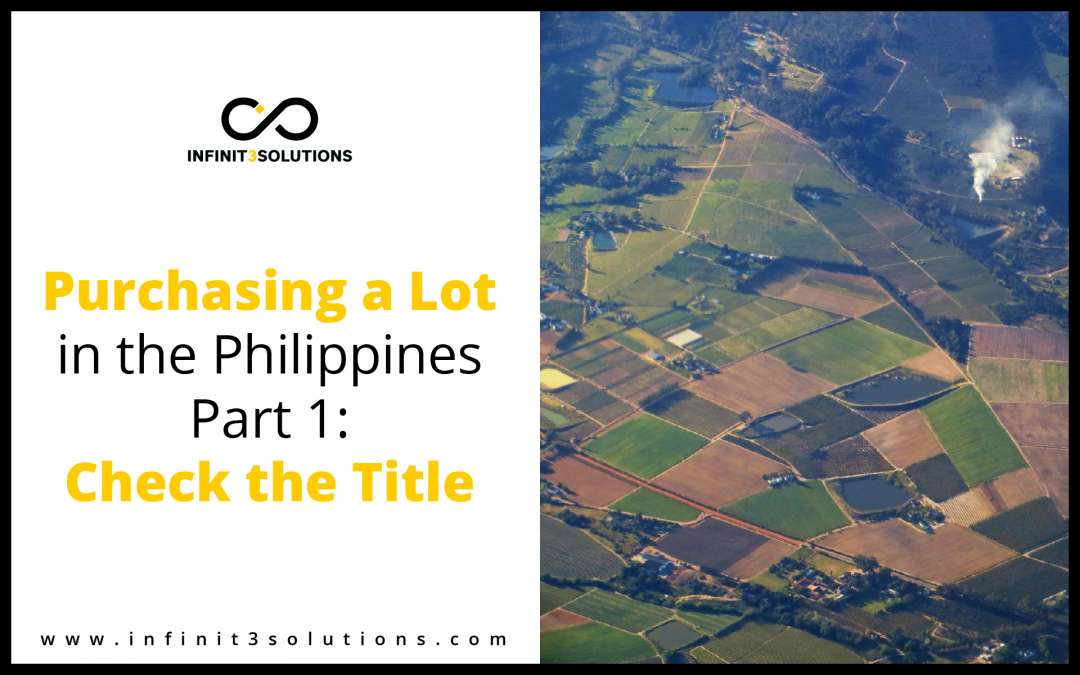Buying a real estate or a land can be one of the smartest ways where you can invest your money in. As city dwellers constantly complain about the pollution and the crowded metropolis, the prospect of retiring in a peaceful beachfront property, or even building apartment rentals for a guaranteed passive income in the future seems like a better option compared to investing a condominium unit. However, buying a land in the Philippines is not as simple as paying the seller and acquiring the land right after that. One of the important things to do before buying a property is to verify the title.
The best and common way to check the ownership of the land is by verifying it at the Registry of Deeds where the land is located. Every Municipality has its own Registry of Deeds, so be sure to seek help with them before buying a land. Another government office where you can check titles is the Land Registration Authority (LRA). But most of the work of the LRA, however, is carried out by the 168 RDs located nationwide, so the RD of each province or city would be the best place to determine a title’s authenticity or existence.
In the Philippine, there are different types of documents to determine and to validate land ownership. Before purchasing a land, make sure to do your homework and check thoroughly with the proper government agencies to confirm the authenticity of the documents. Below are the different types:
LAND TITLE
- the evidence of the right of the owner or the extent of his/her interest, and by which means he/she can maintain control and as a rule assert right to exclusive possession and enjoyment of the property. The document is entitled the Certificate of Title. (Peña, Registration of Land Titles and Deeds, Revised Edition, 1988).
- The best evidence of land ownership is the Certificate of Title. It is sometimes called Original Certificate of Title (OCT), if it is the first title issued on the land, or a Transfer Certificate of Title (TCT) if it was issued succeeding to the first title.
LAND RIGHTS
- refer to the inalienable ability of individuals to freely obtain, use, and possess land at their discretion, as long as their activities on the land do not impede on other individuals’ rights. This is not to be confused with access to land, which allows individuals the use of land in an economic sense (i.e. farming). Instead, land rights address the ownership of land which provides security and increases human capabilities. When a person only has access to land, they are in constant threat of expulsion depending on the choices of the landowner, which limits financial stability. (Source: Wikipedia)
TAX DECLARATION
- A document declared in the assessor’s office where the land is located as a proof of paying the real property tax. However, it is not considered a land title under the Torrens Title System of the Philippines. It is not also a guaranteed evidence of land ownership but it can be a basis. (Source: e-lawyeronline.com)
Two Types of Tax Declaration
-
Alien and Disposable (A&D)
Which means can be handed over to private individuals and can be easier to apply for Titling. The Supreme Court upheld the Regalian Doctrine which provides that all lands that were not acquired from the government—either by purchase or by grant—belong to the public domain. This doctrine has been in effect since the Spanish Occupation. The government has since enforced three land classifications—agricultural land, mineral land, and forest or timber. Out of these three classifications, only agricultural lands are “alienable and disposable.”
-
Inalienable
Which means it remains to be a sovereign property of the State which cannot be given to private control especially if within the protected area like a national park or marine reserves, however, it might be possible to apply for a special Government Tenure. You can check DENR website – http://www.denr.gov.ph/ for more info.
Parts and information on the Title
- Title Form Information – where the type of form, date of revision and serial number can be found
- Survey Information – where the parcel identity (lot, block, survey plan number), location, adjoining parcels, tie point, tie line, bearings and distances from corner to corner and the area and date of the survey can be found
- Registration Information – where the name of the Register of Deeds, title number, book number, page number, place/time/date of registration, name and signature of registrar and historical information (date and place of original registration, OCT No., Volume No., Page No., Decree No., record/name of original owner, number of cancelled title for OCT) can be found
- Ownership Information – where the name/s of all persons whose interest make up the full ownership, citizenship, civil status, postal address
As we have mentioned earlier, better conduct a thorough research before purchasing a land in the Philippines. There are instances wherein the documents presented are fake. According to the LRA, below are some guidelines to spot fake titles:
- Check if the initials, signatures, technical description, annotation and other component elements appearing on the front and at the back of the original title are exactly the same as that appearing on the owner’s duplicate certificate of title. Any variance is a ground for suspicion;
- Every title has a serial number assigned to it. The serial number for the original title is printed in red and the serial number for the owner’s duplicate certificate is in black. The LRA distributes the title forms with a serial number in consecutive order to the various RDs. Any certificate of title bearing a serial number which is not among the ones delivered to a particular RD is of doubtful authenticity;
- The words Judicial Form appear on the upper left-hand corner of each title. If it is an OCT it shows Judicial Form 108-D and if it is a TCT it shows Judicial Form 109-D. Immediately below the Judicial Form number is the year the form was printed or revised. If, for instance, below the words Judicial Form 109-D, the phrase “(Revised January 1985)” appears, and on the bottom right portion of the title besides the seal it indicates that it was entered on a date in 1980, then this is a ground for suspicion;
- The owner’s duplicate copy of the title contains the words “Owner’s Duplicate Certificate” on the left side margin of the title. On the lower left corner of the form is affixed a red seal. The seal should not blot or stain when wet;
- The last two digits of the title number (usually preceded by either the words Original Certificate of Title or Transfer Certificate of Title) should correspond with the page number of the registration book indicated on the upper right-hand corner of the title. Any variance should be investigated;
- The title is printed on security paper which contains security features. The paper is 50% cotton and 50% chemical wood pulp with artificially colored silk fibers. It has a NALTDRA or LRA watermark which can be seen if held against the light. Patently fake titles are usually printed on materials of inferior quality.
- Check if the Registrar of Deeds who signed the title was the incumbent Registrar of Deeds at the time the title was issued;
- If necessary, trace the history of the title to determine the genuineness of its source. This may entail going back to the mother title, the derivative titles and relevant documents, such as deeds of sale, donation, etc.
If you are thinking about making a big real estate purchase but still caught up with a few hesitations, get in touch with our experienced consulting team now and let’s make that dream property a reality! Stay tuned next week for part 2.
Reference:
https://www.lawphil.net/statutes/acts/act_2874_1919.html


